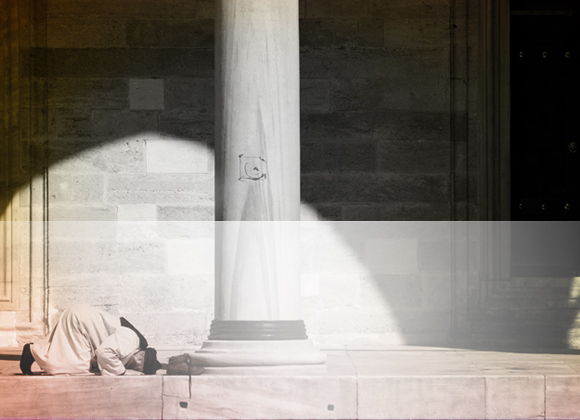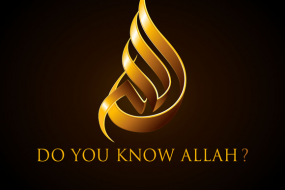
Part I | Part II | Part III | Part IV | Part V | Part VI | Part VII
Whenever we daydream about Jannah, we dream about meeting the Prophet ![]() and living in his company. To listen to him, to watch him intently and to see him smile is something we all desire. Can we turn this dream into a reality? Yes – through abundant prostrations!
and living in his company. To listen to him, to watch him intently and to see him smile is something we all desire. Can we turn this dream into a reality? Yes – through abundant prostrations!
A companion of the Prophet![]() , Rabi’ah bin Ka’b Aslami
, Rabi’ah bin Ka’b Aslami ![]() used to serve the Prophet
used to serve the Prophet![]() and bring water for him. Muhammad
and bring water for him. Muhammad ![]() said to him, “Ask me” The companion replied, “I ask for your company in Paradise.” The Prophet
said to him, “Ask me” The companion replied, “I ask for your company in Paradise.” The Prophet ![]() then asked, “Is there anything other than that?” Rabi’ah replied, “No.” Muhammad
then asked, “Is there anything other than that?” Rabi’ah replied, “No.” Muhammad ![]() said, “Help me for yourself by making prostrations abundantly.” 1
said, “Help me for yourself by making prostrations abundantly.” 1
Sujood is the sweetest part of Salah, when we are most near to our Magnificent Rabb. We lower our self in front of the Almighty and let our forehead touch the ground. This is the symbol of utmost humbleness and servitude. Our actions and limbs proclaim that we have willingly and completely surrendered, and have submitted ourselves to Allah![]() . Although, it becomes a routine mechanical action that we do not think about, the act of Sujood itself is a great reminder.
. Although, it becomes a routine mechanical action that we do not think about, the act of Sujood itself is a great reminder.
A persuasive companion
Upon reflection, Sujood reminds us of who we are. When going through a boost of ego and pride, it brings us back to earth. What are we but tiny, reliant creatures made out of clay. Who am I to pooh and pah others and to think I am better than anyone else? That I can talk better than xyz can talk, that I can write better than xyz can write, that I am a better manager than xyz is, that I have more knowledge than xyz has – whatever abilities and qualities I possess, I owe them to my Lord, Allah![]() . It was pride that prevented Shaitan from prostration. On the contrary, the Sajdah that we do in Salah should serve to squash the pride out of us.
. It was pride that prevented Shaitan from prostration. On the contrary, the Sajdah that we do in Salah should serve to squash the pride out of us.
When amidst a fight with our desires and sins, Sujood comes as a helper, five times a day. It makes the act of obedience ever easier, provided we are mindful when we are doing it. It reminds us of our relationship with Allah![]() and the pact of obedience that we have made by saying ‘La ilaha illallah’. It gives us the resolve and determination to resist our desires and stay firm on the path of Allah’s
and the pact of obedience that we have made by saying ‘La ilaha illallah’. It gives us the resolve and determination to resist our desires and stay firm on the path of Allah’s![]() pleasure. It reminds us of the accountability in front of Allah
pleasure. It reminds us of the accountability in front of Allah![]() on the Day of Judgment.
on the Day of Judgment.
Sujood has the power to bring us closer to Allah![]() . Nonetheless, if it is not persuading and reminding us, it is because we do it without thinking.
. Nonetheless, if it is not persuading and reminding us, it is because we do it without thinking.
I am the servant of the Most High…
While making Sajdah we pronounce ‘Subhana Rabbi al A’laa’ which means ‘Glory is to my Lord, the Most High’.
Think of a person who is the servant of someone in a very high position. He will feel strong at having the back of a strong person, and also he will be vigilant about making mistakes in order to not anger his employer. When pronouncing these words, think of yourself in a similar position. Of course, Allah![]() is above and beyond any comparison.
is above and beyond any comparison.
If you are on the straight path, these words come as comfort. Why are you afraid and dwindling? Your Rabb is the one Most High![]() . If you are doing something for His sake, He is surely not going to forsake you. You have Allah
. If you are doing something for His sake, He is surely not going to forsake you. You have Allah![]() ! He
! He![]() is watching over you, guiding you and supporting you.
is watching over you, guiding you and supporting you.
When you tread upon Allah’s![]() path, when you adopt something for his sake, but you are feeling hesitant and insecure in front of others, these words come to strengthen you. Why should you be embarrassed and shy? You are the representative of the Most High!
path, when you adopt something for his sake, but you are feeling hesitant and insecure in front of others, these words come to strengthen you. Why should you be embarrassed and shy? You are the representative of the Most High!
When feeling unsure about a command of Allah![]() , these words come to convince you. The commands of the Most High are flawless like He Himself is flawless.
, these words come to convince you. The commands of the Most High are flawless like He Himself is flawless.
After having slipped and making mistakes, these words come as caution and advice. Beware; if you are sinning you are disobeying none other but the Most High. They push you to seek forgiveness and repent.
Supplication in Sujood
Like every other act of Salah, the prostration should also be done calmly and completely. Prophet Muhammad ![]() said, “Bow and prostrate properly when you bow and prostrate.” 2
said, “Bow and prostrate properly when you bow and prostrate.” 2
Furthermore, we can gain more Khushu in Sujood by memorizing some other authentic Duas that Muhammad ![]() used to ask during Sujood, and incorporate them in our Salah. The Messenger of Allah
used to ask during Sujood, and incorporate them in our Salah. The Messenger of Allah ![]() encouraged this by saying, “A slave becomes nearest to his Rubb when he is in prostration. So increase supplications in prostrations.” 3
encouraged this by saying, “A slave becomes nearest to his Rubb when he is in prostration. So increase supplications in prostrations.” 3
Aisha ![]() narrated, “I noticed the Prophet
narrated, “I noticed the Prophet ![]() was not there one night, so I started looking for him with my hand. My hand touched his feet and they were held upright. He was prostrating and saying:
was not there one night, so I started looking for him with my hand. My hand touched his feet and they were held upright. He was prostrating and saying:
أَعُوذُ بِرِضَاكَ مِنْ سَخَطِكَ وَبِمُعَافَاتِكَ مِنْ عُقُوبَتِكَ وَأَعُوذُ بِكَ مِنْكَ لاَ أُحْصِي ثَنَاءً عَلَيْكَ أَنْتَ كَمَا أَثْنَيْتَ عَلَى نَفْسِكَ
‘I seek refuge in Your pleasure from Your anger, in Your forgiveness from Your punishment, and I seek refuge in You from You. I cannot praise You enough, You are as You have praised yourself.'” 4
More supplications for Sujood can be found here.
Sitting between the two Sajdahs
Usually we find ourselves going back hurriedly into the next Sujood, without sitting properly in between. Whereas it was narrated that the time taken by the Prophet ![]() in prostrations, bowing, and the sitting interval between the two prostrations was about the same. (Bukhari)
in prostrations, bowing, and the sitting interval between the two prostrations was about the same. (Bukhari)
Prophet Muhammad ![]() used to invoke Allah
used to invoke Allah![]() in this position too. He would say:
in this position too. He would say:
“رَبِّ اغْفِرْ لِي رَبِّ اغْفِرْ لِي”
“O my Lord, forgive me. O my Lord, forgive me.” 5
And also:
اللَّهُمَّ اغْفِرْ لِي وَارْحَمْنِي وَعَافِنِي وَاهْدِنِي وَارْزُقْنِي
“O Allah, forgive me, have mercy on me, guide me, heal me, and provide for me.”6
May Allah![]() grant us the Tawfeeq to beautify our sujood and salah, and enable us to prostrate with our hearts when we prostrate on the ground! Ameen!
grant us the Tawfeeq to beautify our sujood and salah, and enable us to prostrate with our hearts when we prostrate on the ground! Ameen!
Please share your thoughts with us in the comments section below. 🙂








14 replies on “The Secrets in Sujood”
Aameen.
Maa shaa Allah, very beneficial article.
Jazaakillah Khair
Alhumdulillah that you found it beneficial!
Jazak Allah Khair for giving your feedback.
Can we make dua in our own language during salah sajood..
Can we make dua by sajood after salah….
Please guide…JazakAllah Kharein
Please use the following link to get your answer from a knowledgeable scholar.
https://www.facebook.com/DrBilalPhilips/?sk=app_190322544333196&hc_location=ufi
(Questions asked on the “Ask The Shaykh” app are answered by our esteemed shuyookh at Islamic Online University (whose founder and chancellor is Dr. Bilal Philips) and not necessarily by Dr. Bilal Philips.
MOBILE USERS (Android/iOS), PLEASE USE THIS LINK: http://bit.ly/1Yrz4o8)
Jazak Allah Khair!
Masha Allah Very great article. May Allah reward you here and hereafter.Ameen
Jazak Allah Khair! Ameen!
shukran to the writers and contributors .
to be sincere , I’ve gained a knowledge from it . i look forward seeing more of this in my email.
have a nice day.
Jazak Allah khair for your feedback!
This was so powerful! Jazakallahu khairan for this lovely post!
Alhumdulillah that you found it beneficial! 🙂
Jazakallahu kheir
The one who wrote this article is true slave of Allah. MashaAllah Allah increase ur Iman and give Jannatul Firdous. InshaAllah. Keep reading Quran again and again and Act on Allah’s command. JazakAllah
is there any difference in the position of sujood of men and women?
[…] I | Part II | Part III | Part IV | Part V | Part VI | Part […]